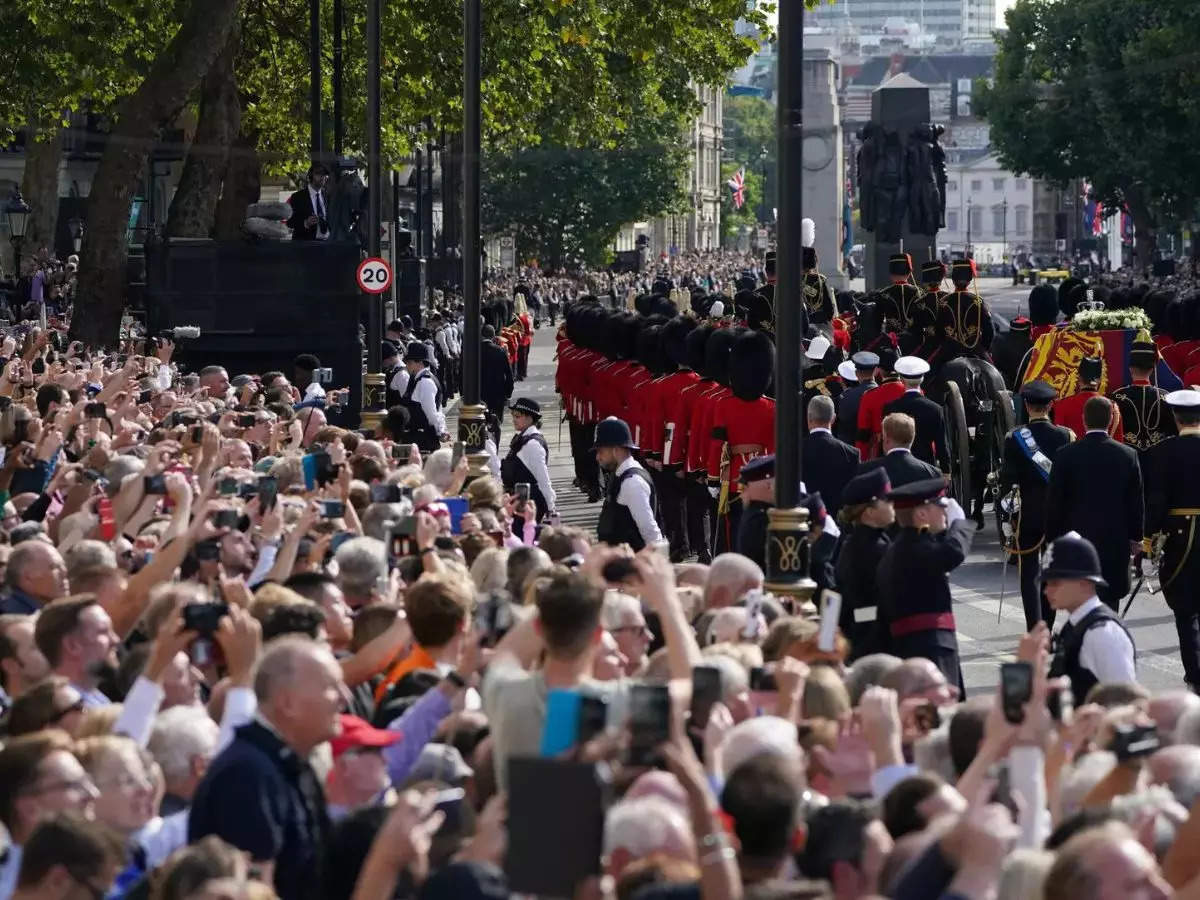
In his essay on the English people, George Orwell remarked that any foreign observer would be struck by their orderly behavior and in particular “the willingness to form queues.” It’s one of those British stereotypes that’s come to mind in recent days, as the mother of all queues lengthens and snakes along the south bank of the Thames river.
As many as 750,000 people were expected to travel to London ahead of the state funeral for the late Queen Elizabeth II on Monday. Queues began forming days earlier on the opposite side of the Thames from the historic Westminster Hall, where her coffin lies elevated on a catafalque. By Thursday late afternoon, the line was nearly 4.3 miles (7 kilometers) long.
We know all this because there’s an official live queue tracker, which reports the length and the average time to destination at a speed of roughly 0.5 miles per hour.
Those standing in line receive wristbands to mark their place. There are “extra welfare facilities” (read: toilets) and water fountains to relieve the discomforts of slowly shuffling along throughout the day and night. There is also detailed guidance on what to bring (food, water), what not to bring (flasks, camping equipment, large bags) and how to behave. There is plenty of security, not that it seems necessary so far, while archival footage of the queen is shown on a large screen. Volunteer faith leaders are on hand to help mourners process what they are experiencing. Not even Disneyland, with its celebrated queue-management strategies, can match this.
That so many came from so far to wait so long for such a brief look at the late monarch’s coffin will strike many around the world as curious and some as excessive. People took days off work and pulled children out of school. They are not waiting for the latest iPhone, but for a chance to pay their respects to someone most of them have never met.
Most Americans tend to disdain long lines. “It was incredible,” texted a friend as she returned home from a trip to London amid the travel chaos this summer. “Took me two hours to get into Heathrow and people were just tolerant and dutiful. Would never happen in the US. Americans would be irate and there would be chaos.”
For the rugged individualist, queues generally feel like a poor use of time, suggest bad organization and seem testament to a herd mindset. They can be uncomfortable if you’re wearing the wrong shoes or don’t have bathroom access. In the early ‘90s, I lost all feeling in my toes after standing in line in minus 20 degree Celsius (minus 4 Fahrenheit) temperatures to buy a few essentials at a generic Moscow grocery store.
Yet we all queue as an unavoidable means to an end — to get through airport security or onto a ski lift or into a museum exhibition. I happily waited in a long line one February to purchase a spectacular hot chocolate at a stand in Paris. But I’ve never done anything like what hundreds of thousands of Britons and visitors are doing right now. It takes a certain stoicism, humility and determination to drop everything and be part of that. In the never-ending debate about whether there’s such a thing as society, here seems hefty evidence of it.
Orwell wasn’t wrong; there is something to the British reputation as queue-tolerant, which some date back to the industrial revolution and others to wartime rationing. Proper queuing is so synonymous with common decency that when the UK set up its first citizenship test in 2010, how to form a good queue was on it. When former Prime Minister Boris Johnson wanted to defend his policy of sending refugees to Rwanda, he accused male refugees of “paying people smugglers to queue jump.”
But the reputation of a nation eager to stand in line — the Brit who joins the back of a queue before asking what it’s for — is mostly overblown. Yes, Brits wait in line overnight for Wimbledon tickets, but Americans camp out for tickets to a Duke University basketball game. Brits were as furious about the travel chaos as anyone, as they made clear on social media. Even recent reports that Tesco shoppers preferred to queue than to use the self-checkout turned out to be overblown.
Those queuing to view the Queen describe many motives: to be part of a unique moment in the long life of Britain, to express gratitude and to pay their respects. The deaths of other historical figures have drawn large-scale public gatherings in the past, but nothing quite like this.
About 200,000 came to pay their respects to the Queen Mother in 2002. More than 300,000 passed through Westminster Hall to pay tribute to George VI in 1952. A was a similar turn out to honor Britain’s wartime leader Winston Churchill — the wait was about three hours and the line was about a mile long. Some 250,000 Americans waited as long as 10 hours to witness John F. Kennedy’s lying-in-state. About 100,000 mourners paid homage to the late South African President, Nobel peace laureate and world-changer Nelson Mandela, with many disappointed they were prevented from doing so. I’m setting aside the communist figures of Mao and Lenin.
By all accounts, the vibe among those waiting to pay their respects is solemn, neighborly, expectant, joyful, sorrowful and, above all, determined. People made new friends, stood in silence or chatted. Nobody seemed in any doubt that the wait was worth it. Those emerging from the historic hall describe the experience as visceral.
FOMO aside, how eager would you be to join a queue stretching some five miles and lasting up to 30 hours? If you asked me a few weeks ago, the answer would have been swift. Now, I’m not so sure. But I’m glad there are so many who don’t hesitate.







